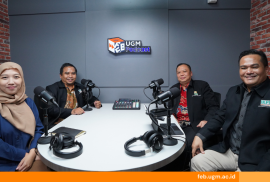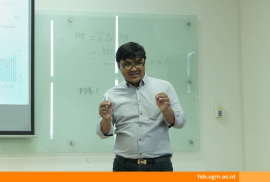Embracing the growth, opportunities, and challenges of the Non-Bank Financial Industry (IKNB) in Indonesia, Friday (21/10) Laboratory of Economics, Faculty of Economics and Business Universitas Gadjah Mada (FEB UGM) in collaboration with PT Indonesia Financial Group (IFG) held a Seminar and Lecture General (SinarKU) entitled “The Role of the Insurance Industry and Pension Fund for the Indonesian Economy” at the Learning Center Auditorium FEB UGM. The event was started by the Vice Dean for Research, Community Service, Cooperation, and FEB UGM Alumni, Gumilang Aryo Sahadewo, S.E., M.A., Ph.D. This event invited four speakers, namely Ibrahim Kholilul as Senior Research Associate at IFG Progress, Nada Serpina as Research Associate at IFG Progress, M. Alvin Prabowosunu as Research Associate at IFG Progress, and Rimawan Pradiptyo as Head of the Department of Economics FEB UGM.
Ibrahim opened the presentation session by joking that in the song Menabung by Titiek Puspa, the singer did not include “insurances”. In line with this, we know that in terms of popularity, the main financial instrument is saving, while the main financial institution is banking. Even though there are other financial institutions that are also close to us, such as insurance. To illustrate the importance of insurance, Ibrahim explained Ando & Modigliani’s life cycle theory (1963) which describes that at the peak of our careers (age range 40), we tend to spend a lot of money but often forget to save. Then, Ibrahim explained that the financial sector assets in 2021, the role of IKB in the Indonesian economy is still relatively low compared to other countries. In fact, the financial sector plays a fundamental role in the country’s economy, one of which is as a source of financing to support Indonesia’s ambition to become the world’s top 5 economies. In relation to IKNB, Ibrahim introduced IFG as an Insurance and Guarantee BUMN holding which has three pillars of formation: Prudent, Power, Progress. Within the scope of IFG, there is IFG Progress as a think tank with a research focus on IKNB. Ibrahim also explained that the opportunity for FEB students to contribute to IKNB is quite wide, including investment experts, economists, to actuaries & underwriters.
Nada Serpina continued the presentation session on the role, challenges, and efforts to reform insurance for the Indonesian economy. Nada explained about the insurance ecosystem which is closely related to business and the economy because it covers risks in almost all human activities, from life/health, business, to natural disasters. Nada also explained about reinsurance, namely the underwriting or sharing of risks in the insurance company. Then, Nada explained about the type of insurance business which includes general insurance and life insurance. Nada continued with subsections on the role of the insurance industry, including supporting family economic resilience, providing financial protection, supporting the National Health Insurance (JKN) and mitigating business risks. In terms of challenges, Nada explained that the insurance industry has two fundamental challenges, namely literacy and utilization. He explained that the level of financial literacy in Indonesia shows that only one in two Indonesians understands insurance. Responding to these challenges, Nada proposed reforming the three aspects of the insurance industry, namely consumers, regulators and industry. Improvement efforts must also be accompanied by the synergy of regulators, industry, business actors, and academics.
Alvin continued SinarKU with an explanation of the importance of the Pension Fund Industry. He begins by telling the story that in Ireland, professionals in the pension fund industry are highly valued because of the industry’s vitality in the country’s economy. No exception, Indonesia is currently experiencing a demographic bonus. The end of the demographic bonus in 2045 will cause pension funds to receive a significant increase in burden due to the burden of productive age to bear old age which will increase. Then, Alvin explained about the positive side of pension funds, for example pension fund assets contribute as a source of long-term financing for economic development including the capital market, deposits and government securities. Alvin also explained the structure of the Indonesian pension fund system which is divided into two, namely mandatory pension funds and voluntary pension funds. Pension funds in Indonesia include Taspen, Asabri, BPJS Kenaker, DPPK, and DPLK. However, pension funds in Indonesia have several challenges including pension coverage and contribution levels. In fact, the proportion of active labor force contributions to pension funds in Indonesia is the second lowest in the cross-country analysis compared to several countries. There is also the issue of investment policy as one of the challenges of the pension fund industry. As a solution, Alvin explained that adequate human resources are needed to contribute to efforts to improve the pension fund industry. Contributions can be made by various elements of business and society, from policy makers, academics, entrepreneurs, to investment managers.
Rimawan Pradiptyo continued the seminar session with a presentation entitled “When the Insurance Industry Becomes the ‘Lender of the Last Resort'”. Rimawan started his presentation with pre-pandemic conditions which economists predict will not return in the next 5-10 years due to Volatility, Uncertainty, Complexity and Ambiguity (VUCA), escalation, and changes in the development paradigm. Rimawan revealed that one of the problems inhibiting the growth of IKNB in Indonesia is the narrative of abundance, even quoting the Koes Plus song “Wood sticks and stones become plants”. This narrative of abundance has led to minimal public spending on insurance products and pension funds. Rimawan also explained about the bargaining position and supply network at IKNB. Then Rimawan explained more in-depth research on public enthusiasm and preferences regarding pension funds and insurance using the Zaltman Metaphor Elicitation Technique (ZMET). After the presentations by the four speakers, SinarKU ended with a question and answer session.
Reportage: Hayfaza Nayottama




